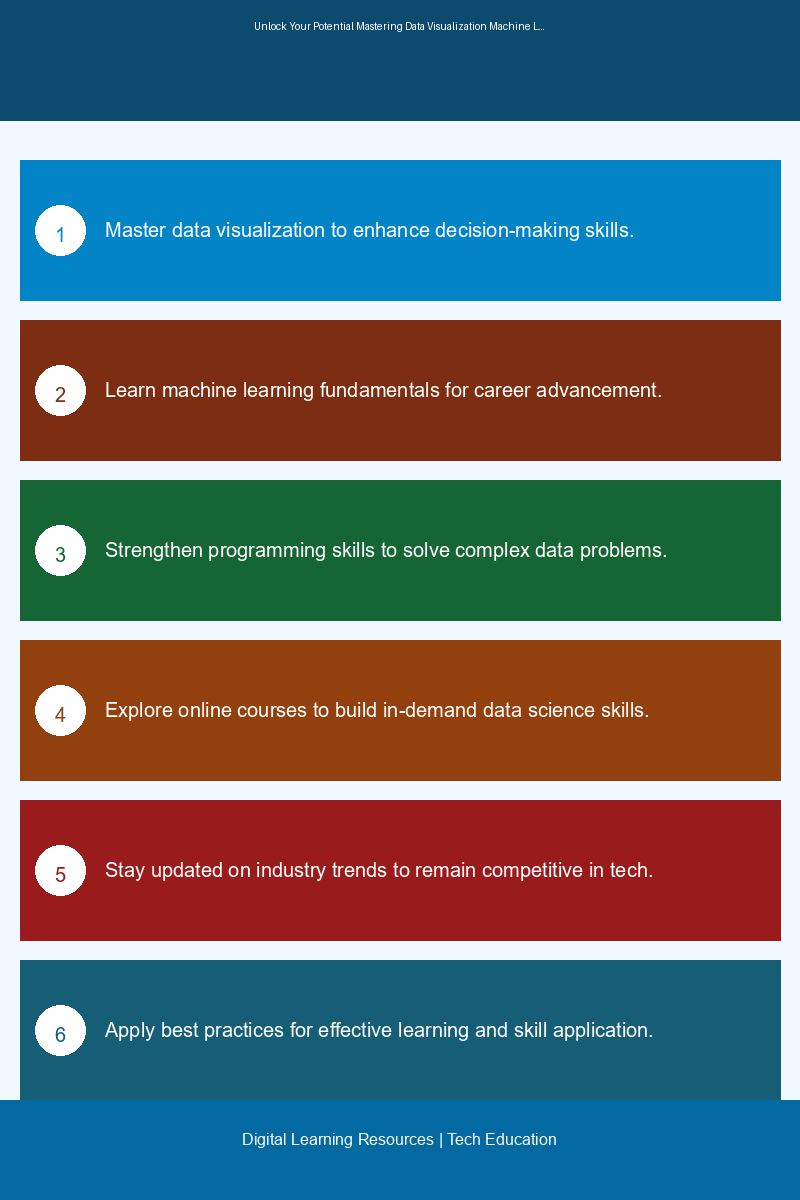Key Takeaways:
- Understand essential technical concepts in data visualization, machine learning, and programming.
- Explore educational pathways to build in-demand skills.
- Recognize industry trends shaping the future of tech careers.
- Implement best practices for effective learning and application.
Introduction
In today’s fast-paced tech landscape, the convergence of data science, machine learning, and programming is reshaping industries and creating a demand for skilled professionals. Mastering these areas not only enhances your technical capabilities but also positions you to leverage data-driven insights for strategic decision-making. This blog post provides an in-depth look at the foundational concepts, practical applications, learning paths, and future trends that define the tech industry today.
Technical Background and Context
Understanding the technical concepts is crucial for any aspiring data professional. Here are some key areas to focus on:
📚 Recommended Digital Learning Resources
Take your skills to the next level with these curated digital products:
AI Enhanced Resume Builder
AI Resume Builder Flask App – Complete Source Code + PDF Tutorial + HTML | Digital Download for Designers
Learn AWS: Your First Cloud Application
Learn AWS: Your First Cloud Application
📊 Key Learning Points Infographic

Visual summary of key concepts and actionable insights
Comprehensive SAT Prep: 470+ Vocabulary Words
Comprehensive SAT Prep: 470+ Vocabulary Words
Master DevOps in Practice – 50 Essential Topics for Engineers (PDF eBook)
Master DevOps in Practice – 50 Essential Topics for Engineers (PDF eBook)
The Ultimate Keyboard Shortcut Guide 49 Software Cheat Sheets in One PDF Bundle
The Ultimate Keyboard Shortcut Guide 49 Software Cheat Sheets in One PDF Bundle
- Data Visualization Techniques: Tools like Tableau and Power BI enable the creation of interactive dashboards, while libraries like Matplotlib and Seaborn facilitate data visualization in Python. Mastering these tools allows you to convey complex data insights visually.
- Machine Learning: Frameworks such as TensorFlow and PyTorch are essential for building predictive models. Understanding algorithms and their applications enables you to develop solutions that automate decision-making processes.
- Programming for Data Manipulation: Proficiency in languages like Python and R allows for efficient data manipulation and algorithm implementation, while SQL is fundamental for database management.
- Probability and Statistics: These concepts are critical for accurate data analysis, enabling professionals to make informed decisions based on statistical evidence.
- Deep Learning: Specializing in neural networks equips you to tackle complex problems, such as image recognition and natural language processing.
Practical Applications and Use Cases
The practical applications of these technical skills are vast and varied:
- Data Visualization: Create dashboards that track key performance indicators (KPIs) in real-time, helping businesses make informed decisions quickly.
- Machine Learning: Develop predictive maintenance models for manufacturing, allowing companies to preemptively address equipment failures.
- Programming: Automate data extraction and processing tasks to save time and minimize errors in data handling.
- Statistics: Use statistical analysis to evaluate marketing campaigns, optimizing budget allocation based on data-driven insights.
- Deep Learning: Implement neural networks for advanced image and speech recognition applications in various industries, from healthcare to finance.
Learning Path Recommendations
To thrive in this evolving landscape, consider the following educational opportunities:
- Data Visualization Courses: Explore online courses focused on Tableau and Power BI to enhance your ability to create compelling visual narratives.
- Machine Learning Framework Training: Dive into TensorFlow, PyTorch, or Scikit-Learn through structured courses that provide hands-on experience.
- Programming Education: Invest time in learning Python or R through interactive coding platforms and online tutorials.
- Statistics and Probability Courses: Take advantage of online resources to solidify your understanding of statistical methods and their applications in data analysis.
- Deep Learning Specialization: Enroll in programs that focus on neural networks, preparing you for cutting-edge applications in AI.
Industry Impact and Career Implications
The demand for data scientists with a multifaceted skill set is on the rise. As we approach 2025, industries are increasingly leveraging machine learning and deep learning technologies to drive business growth and innovation. Key implications for your career include:
- Job Opportunities: A strong foundation in data science can open doors to various roles, including data analyst, machine learning engineer, and data scientist.
- Skill Diversification: Employers are looking for candidates who not only possess technical skills but also excel in soft skills like problem-solving and communication.
- Data-Driven Decision Making: Professionals who can interpret data and provide actionable insights are invaluable to organizations aiming for growth.
Implementation Tips and Best Practices
As you embark on your learning journey, here are some actionable tips to maximize your efforts:
- Practice Regularly: Consistency is key. Engage in projects that challenge your skills and reinforce your learning.
- Collaborate with Peers: Join communities or forums to share knowledge and tackle problems collaboratively.
- Stay Updated: Follow industry trends and new technologies to keep your skills relevant in a rapidly changing environment.
- Build a Portfolio: Document your projects and achievements to showcase your skills to potential employers.
- Seek Feedback: Regularly ask for feedback on your work to identify areas for improvement.
Future Trends and Skill Requirements
Looking ahead, several trends are set to shape the tech landscape:
- AI and Automation: The integration of AI into business processes will continue to accelerate, increasing the need for skilled professionals who can develop and implement these technologies.
- Increased Focus on Data Ethics: As data usage grows, so does the importance of ethical considerations in data handling and machine learning practices.
- Interdisciplinary Skills: Professionals who can combine technical expertise with business acumen will be particularly valuable.
Conclusion with Actionable Next Steps
As you navigate the world of data science, machine learning, and programming, remember that continuous learning and adaptability are essential. Here are some actionable next steps to enhance your career:
- Choose a specific area of focus and enroll in related courses today.
- Start a personal project to apply what you’ve learned and build your portfolio.
- Network with professionals in the field through online platforms or local meetups.
- Stay curious and proactive about emerging trends and technologies in data science.
By investing time in developing these skills and remaining engaged with the community, you can position yourself for success in the ever-evolving tech landscape.
Disclaimer: The information in this article has been gathered from various reputed sources in the public domain. While we strive for accuracy, readers are advised to verify information independently and consult with professionals for specific technical implementations.
Ready to advance your tech career? Explore our digital learning resources including programming guides, certification prep materials, and productivity tools designed by industry experts.



